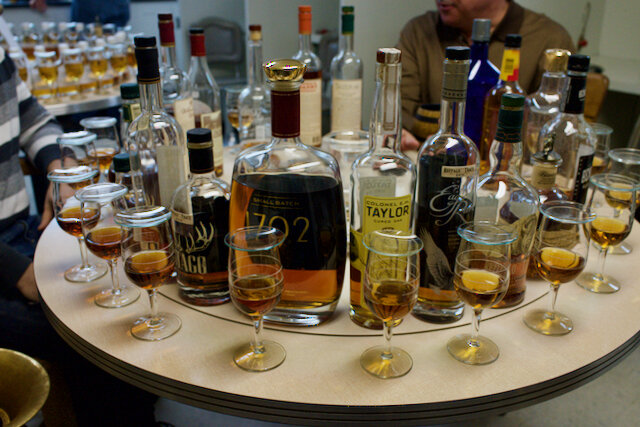Lessons Learned from Drinking Professionally
/Competitive drinking is tough. After college, anyway. And, no, I don't mean to drink as much as possible in a short period of time. I mean, when it comes to judging whisky competitions with the purpose of scoring them on a 100 point scale.
The majority of competitions run in the November and December timeframe. That means I’m scoring about 150 whiskies (and 150 spirits) a year in that two month period. It gets intense. I get a lot of questions about this, so I thought I’d share answers to the ones I get most often.
What makes this competition work is all the tasting is done blind. I’d show you a picture of my dining room table, but unfortunately I’m under NDA (non-disclosure agreement) for all the tastings I specifically do. So instead, cottage drinking:
How do whisky competitions work?
The ones that I judge, it’s fairly simple. I’m sent a bunch of samples. They’re numbered. I don’t know what they are. I score them two or three times, and hand in a final score with some tasting notes. In some competitions, I’ll eventually know what whiskies I’ve tasted, while in others I’ll never know.
Do you get drunk drinking all that whisky?
Drunk, no, but buzzed, most definitely. My palate is often good for six to eight different whiskies in an hour's time. I have less than a quarter ounce of each sample, but especially with boozier whiskies, that means I consume anywhere between one and two drinks worth of alcohol. I'm at least "one drink buzzed" and sometimes "two drinks" buzzed.
Do you really do tastings in the mornings?
Yes. The palate is cleanest in the morning. I brush my teeth, avoid breakfast, and drink coffee with plenty of water. It's very personal, though. There are people that can't drink coffee; it changes their palate. There are others that taste whisky just before lunch when they're hungry because they find their palate most sensitive then. It really does depend.
I will, sometimes, have a second session in the afternoon if I feel my palate is doing well. I will always taste something at least two times, and I've done comparisons. Sometimes my palate sucks in the afternoons (in which case I stop the session), and sometimes I'm getting great tasting notes and I go on.
Do you avoid certain foods while tasting whisky?
I avoid heavily salted foods, deep-fried foods, and sugary foods for a few days. I'm often scoring whisky four or five days a week, so I'm large avoided all those foods throughout the month. I'm not strict about it, but if I have fried salty foods one day, I won't score whisky the next day.
Each person’s palate is different, but I find salty foods changes how my palate interprets things the next day. My palate seems less particular and I’m less discriminating with how I score whisky. This is bad from a few perspectives; I'm less aware of the faults, it creates inconsistency in my scores (depending how much food I've had), and my job is to be a critic.
There's little science on this, but in my experience, having delicious fried food the day before means my palate is off and inconsistent the next day.
What about glassware?
Each competition has its preferred glassware. The World Whisky Awards uses a stand ISO wine glass. San Francisco's Spirits Awards use the NEAT glass. Others, recommend the Glencairn glass. Yes, glassware matters.
For the majority of my tastings, I use Glencairn glassware, and I rotate about 50 glasses through the dishwasher while tasting whisky daily.
You use a dishwasher for your glassware?!
Controversial; lots of people in the business hand-wash their glassware. I'm an exception. Some of this has to do with the water quality (hard vs soft) and the dishwasher used. I have had, in the past, dishwashers that left a weird veggie smell on my glassware. My current dishwasher is great. I nose every glass before I pour whisky into it. If it smells off, I don't use it. If it smells like the room, we're good to go.
Storage of glassware is more important than how it's washed.
I store my glassware in just a regular cabinetry made of wood. The smell of the wood gets into the glass, and that does affect my tasting notes. When scoring whisky, I wash the glasses and leave on the dining room table until I’m ready to drink.
What other weird things can affect tasting notes?
Room temperature! Sure, the smells in the room can/will affect tasting notes, but the temperature of the room is a big deal. Ryes, for example, are far rougher at above 22+ Celsius while soften at cooler temperatures. Scotches are a little sweeter. These aren’t massive changes, but when a few points on a 100 point scale matter, this does make a difference.
Steps to drinking whisky:
Nose the glass. Does it smell like the room? Good. Go on.
Pour the whisky and let it rest for a minute. Whisky is volatile. When you pour it, a lot is going on, and you need to lest it rest.
Nose the whisky with the mouth open, breathing in as little as I can, and switching between nostrils. This is a fairly standard method of nosing. Some favor one nostril over the other. I just go with what feels the best that day. Score.
Taste the whisky with a gentle sip, write notes, take a bigger sip as needed. This part is complicated because whiskies come at different levels of alcohol content. How much I sip of it is largely determined by the flavors that I'm getting. Score.
Sip at it a few times. Here's the thing about whisky; a rye is different from a scotch from something else. Each is drank a little differently. I'm optimizing how I drink what I'm drinking to get the most flavor from it. So this part is, most definitely, more of an art than a science and difficult to put into words.
After the initial tasting, I put it away, and have a second or third tasting. I'm looking for consistency. Everything I taste is absolutely blind. When I score the whisky a second time, I've expecting a similar score. If there's a difference, I taste it a third time.
How consistent is your scoring?
It's about 90% consistent in a single sitting. Scoring whisky is not a science. We do our best. After three tastings, I've got a score I'm comfortable with.
There are always, though, a few whiskies that I can never quite settle on; sometimes they taste great, sometimes not. To me, these are edge cases that are often terrific but different from the usual whisky profile. I often default these to the higher range of scores because I want to reward something that’s a little different from the regular.
The palate is subjective. It’s subjective on a personal level, but it’s also subjective day-to-day. Some studies point to a how our cravings are defined by what our bodies need. In that way, I can’t ever have the exact same palate. I can, though, have a consistent procured.




